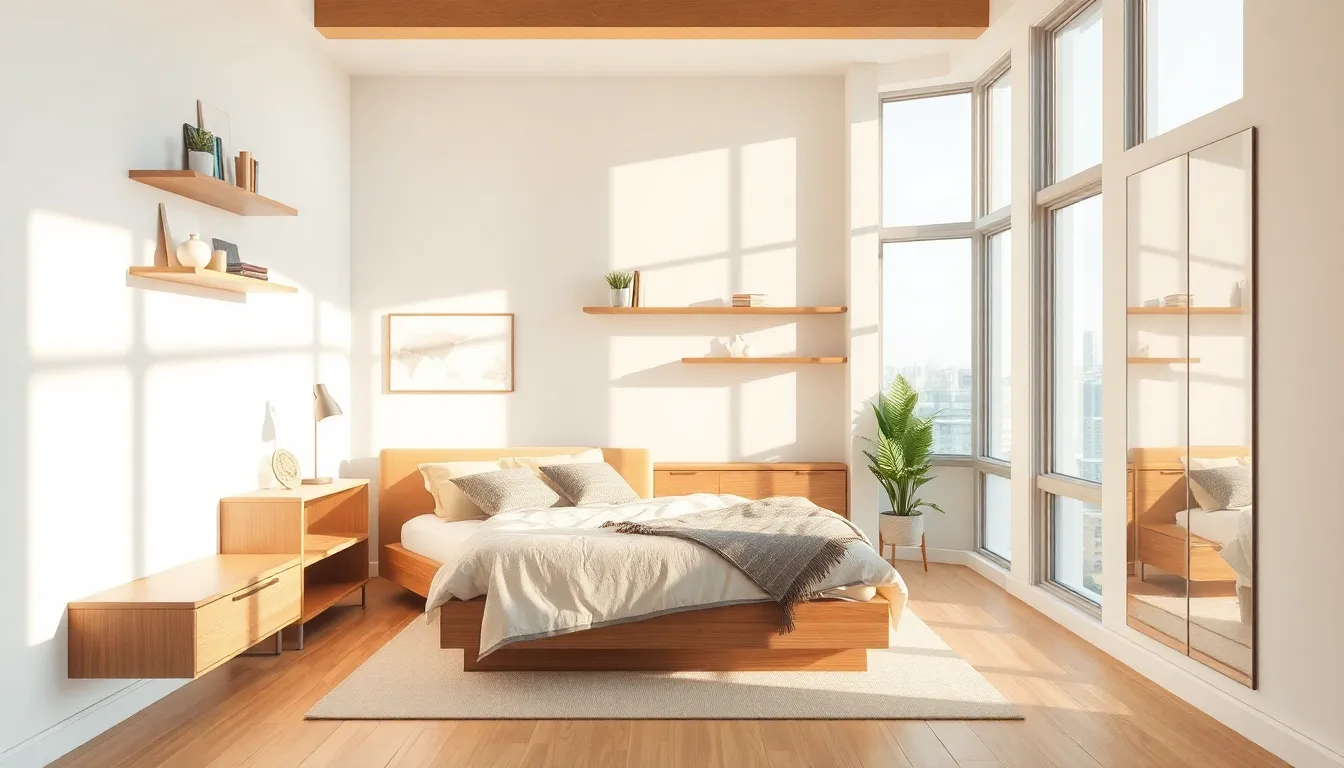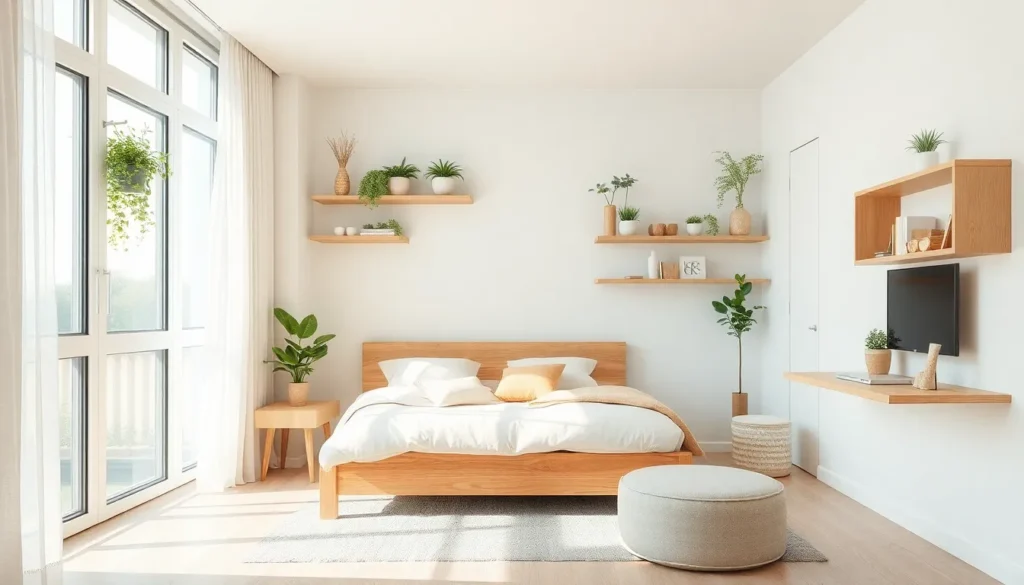In a world where space is at a premium, small bedrooms can feel like a cozy embrace or a claustrophobic nightmare. With the right design tricks, however, they can transform into stylish sanctuaries that maximize every square inch. Who says you can’t have a little luxury in a tiny space?
Understanding Small Bedroom Interior Design
Small bedrooms present unique design challenges and opportunities. Creating a stylish yet functional space requires careful planning.
Importance of Functionality
Functionality serves as the backbone of small bedroom interior design. Maximizing storage capacity is crucial in ensuring a clutter-free environment. Multi-functional furniture, such as beds with built-in drawers or foldable desks, enhances versatility. Adopting a minimalist approach can also keep the space open and airy. Efficiently arranged layouts, like placing the bed against the longest wall, allows for better flow. Strategic use of vertical space, particularly with shelves, adds both storage and visual interest.
Creating a Cozy Atmosphere
Creating a cozy atmosphere transforms small bedrooms into inviting retreats. Soft textiles, including plush bedding and layered rugs, add warmth and comfort. Selecting a soothing color palette, with muted tones or pastels, promotes relaxation. Ambient lighting, through lamps or fairy lights, contributes to a serene ambiance. Personal touches, such as framed photos or decorative pillows, introduce character without overwhelming the space. Incorporating natural elements, like plants, can also enhance the overall tranquility of the bedroom.
Key Principles of Small Bedroom Design

Designing small bedrooms involves strategic principles that create a harmonious balance between style and function. Effective small bedroom design emphasizes space optimization and light utilization.
Maximizing Space
Maximizing space requires clever furniture arrangements. Furniture pieces with dual functions, like a bed with built-in storage, minimize clutter. Vertical storage solutions help use wall space efficiently. Choosing smaller-scale furniture allows for easier movement within the room. Mirrors can enhance the feeling of space and reflect light, making the room seem larger. Additionally, open shelving provides practicality while showcasing decorative items.
Utilizing Natural Light
Utilizing natural light transforms a small bedroom into a bright, inviting space. Large windows or strategically placed mirrors amplify sunlight. Light, sheer curtains let in brightness while offering privacy. Neutral color palettes on walls and bedding enhance the effect of light, creating airiness. Dark colors can make a space feel cramped. Positioning furniture away from windows ensures unobstructed light flow, contributing to a more expansive atmosphere.
Color Schemes for Small Bedrooms
Choosing the right color scheme significantly impacts the perceived size and ambiance of a small bedroom. Light colors tend to create an airy feel, while dark colors can add drama but may make the space feel confined.
Light Colors vs. Dark Colors
Light colors such as whites, creams, and soft pastels enhance brightness and openness. These shades reflect natural light, making any room appear larger. Contrarily, dark colors like navy or charcoal can evoke coziness yet risk overwhelming small spaces. For effective use, limit dark tones to accent walls or furnishings, ensuring balance without sacrificing openness. Combining light and dark shades provides depth while maintaining spaciousness, making it possible to create contrast and visual interest.
Accents and Patterns
Using accents adds depth and personality to a small bedroom. Select bold hues for pillows, art pieces, or throws to draw the eye and create focal points. Patterns in textiles or wall art can add character, but moderation is key to avoid overwhelming the space. Geometric designs or subtle florals offer sophistication without cluttering the aesthetic. Consider incorporating textures through rugs or curtains to elevate the design while keeping the overall scheme cohesive. Thoughtfully chosen accents and patterns can enhance the room’s appeal, ensuring style remains functional.
Furniture Selection
Selecting the right furniture is essential in small bedroom design. Thoughtful choices enhance both functionality and aesthetics while maximizing limited space.
Space-Saving Solutions
Space-saving solutions play a vital role in small bedrooms. Opt for beds with built-in storage to keep items organized. Consider wall-mounted shelves to utilize vertical space effectively. Foldable tables provide versatility, serving multiple purposes without occupying permanent floor space. Chairs that stack or nest can offer seating options without clutter. Using a corner desk can create a workspace while minimizing the room’s footprint. Each of these strategies allows for an efficient design that maintains a sense of openness.
Multi-Functional Furniture
Multi-functional furniture enhances utility in compact spaces. Beds that convert into sofas provide additional seating during the day. Ottomans with storage compartments combine style and practicality. Desks that double as nightstands help save space while fulfilling two functions. Stylish Murphy beds can transform a room from a bedroom to a living area as needed. Each piece serves a dual purpose, which keeps the space under control and organized. Prioritizing these versatile items ensures the small bedroom remains functional and stylish.
Small bedrooms don’t have to compromise style or comfort. With strategic design choices and a focus on functionality, these spaces can become inviting retreats. By maximizing storage and utilizing multi-functional furniture, it’s possible to create a clutter-free environment that feels open and airy.
Incorporating light colors and natural elements enhances tranquility while clever arrangements ensure a smooth flow. Thoughtful accents can add personality without overwhelming the room. Ultimately, embracing the unique challenges of small bedroom design allows for a personalized sanctuary that reflects individual style and meets practical needs.





